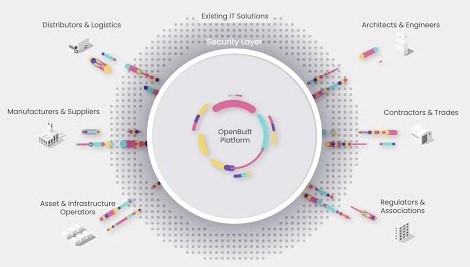OpenBuilt supply chain technology platform
Contents |
[edit] Introduction
Companies across the built environment and construction industry - including architects, building material suppliers, manufacturers, construction and engineering firms - are moving away from largely manual processes and adopting digital alternatives in an effort to develop more effective ways of working.
As part of this trend, IBM, Red Hat and Cobuilder are collaborating on a technology platform that connects construction industry supply chains. Named OpenBuilt, the platform will permit companies to connect their current technology platforms and digital solutions securely to partners, suppliers or subcontractors in their supply chain through a single integration hub. The platform will incorporate Red Hat OpenShift running on IBM Cloud.
[edit] Product development
Collaborative development will initially focus on three areas:
- Establishing OpenBuilt using Red Hat OpenShift running on IBM Cloud to enable construction companies to adopt a hybrid cloud approach and connect their supply chain. To maintain consistent technical language, OpenBuilt will use Cobuilder's data templates to structure all data in a way that allows for machine-readability and interoperability with existing and future systems.
- Integration of independent software vendors to make an array of software and services accessible. IBM solutions and Salesforce open APIs will be integrated into the platform during the development to enable users to build functionality into their intelligent workflows.
- Development of new applications including a solution that will enable organisations to search, filter and sort building product technical data. Cobuilder's data dictionary solution Define will be among the fundamental technologies enabling the use of a common language within the initial OpenBuilt flagship applications.
[edit] Collaboration partners
The cross industry partnership seeks to provide a platform that is suitable for all forms of buildings (residential, industrial, commercial, hospitals, schools), all economic infrastructure (civil engineering infrastructure, above and below ground) and the urban space and landscape between and around buildings and infrastructure.
Other representatives in the development process include:
- CEMEX, a global building materials company.
- EDIN Network, a global network of merchants, manufacturers and service providers.
- Sol Services, a regional mechanical, electrical and fit out organisation.
- Backe, a family owned construction and property development company with operations throughout Norway.
- Element Materials Technology, a global provider of testing, inspection and certification services for materials, products and technologies in advanced industrial supply chains.
[edit] Response
Mark Farmer, CEO of Cast Consultancy and Independent Champion for Modern Methods of Construction in Homebuilding for UK Government, commented, “In pursuing the broad goal of construction industry transformation, there is a critical need to break down the deep silos and fragmentation that exists in how we organise and operate design, manufacture, construction and operation processes.
“This is equally true in the emerging digitalisation challenge. To create more strategic and scalable intelligent workflows, we need data and software to be part of a fully connected ecosystem. The concept of digital platforms is nothing new, but if construction is ever going to realise the full potential of some of the technology solutions that are now proliferating, and if those solutions are ever going to be given the chance to scale to maturity, then there is a need for market leadership in creating a unifying platform that can host these solutions and enables interoperability.
“What IBM and partners are offering through OpenBuilt is the opportunity to act as a digital integrator at an international and industry wide level, gluing together what is becoming an increasingly fragmented digital marketplace for construction technology solutions. This is an important step forward which has great potential to make our industry more efficient”.
[edit] Related articles on Designing Buildings Wiki
- Beyond BIM: Knowledge management for a smarter built environment.
- Cloud computing.
- Collaborative practices for building design and construction.
- Enterprise resource planning ERP.
- Fragmentation of the UK construction industry.
- Supply chains in construction.
[edit] External resources
Featured articles and news
A case study and a warning to would-be developers
Creating four dwellings for people to come home to... after half a century of doing this job, why, oh why, is it so difficult?
Reform of the fire engineering profession
Fire Engineers Advisory Panel: Authoritative Statement, reactions and next steps.
Restoration and renewal of the Palace of Westminster
A complex project of cultural significance from full decant to EMI, opportunities and a potential a way forward.
Apprenticeships and the responsibility we share
Perspectives from the CIOB President as National Apprentice Week comes to a close.
The first line of defence against rain, wind and snow.
Building Safety recap January, 2026
What we missed at the end of last year, and at the start of this...
National Apprenticeship Week 2026, 9-15 Feb
Shining a light on the positive impacts for businesses, their apprentices and the wider economy alike.
Applications and benefits of acoustic flooring
From commercial to retail.
From solid to sprung and ribbed to raised.
Strengthening industry collaboration in Hong Kong
Hong Kong Institute of Construction and The Chartered Institute of Building sign Memorandum of Understanding.
A detailed description from the experts at Cornish Lime.
IHBC planning for growth with corporate plan development
Grow with the Institute by volunteering and CP25 consultation.
Connecting ambition and action for designers and specifiers.
Electrical skills gap deepens as apprenticeship starts fall despite surging demand says ECA.
Built environment bodies deepen joint action on EDI
B.E.Inclusive initiative agree next phase of joint equity, diversity and inclusion (EDI) action plan.
Recognising culture as key to sustainable economic growth
Creative UK Provocation paper: Culture as Growth Infrastructure.
Futurebuild and UK Construction Week London Unite
Creating the UK’s Built Environment Super Event and over 25 other key partnerships.
Welsh and Scottish 2026 elections
Manifestos for the built environment for upcoming same May day elections.
Advancing BIM education with a competency framework
“We don’t need people who can just draw in 3D. We need people who can think in data.”


























